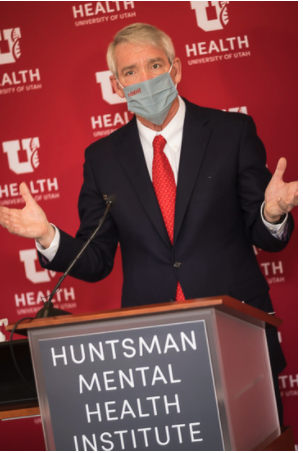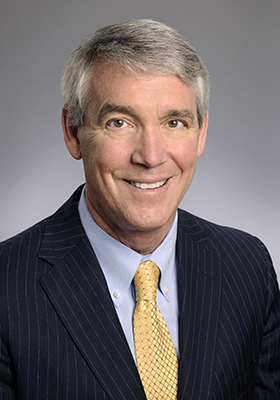Voices of U of U Health
A Champion of Mental Health Care
Mark Rapaport, MD, is CEO of Huntsman Mental Health Institute (HMHI) at University of Utah Health, dedicated on January 14, 2021. Rapaport explains what led him to the field of psychiatry and shares his determination to improve the way brain and psychiatric disorders are treated in Utah.
Why Psychiatry?
I did not intend to study psychiatry, nor did I intend to become a physician. It was late in college when I decided to aim for medical school. I had long kept the possibility in the back of my mind, but I rebelled for years because it felt preordained. My maternal and paternal grandfathers were physicians. My dad was a prominent hematologist who knew the legendary Max Wintrobe, one of the world's foremost hematologists and first chair of medicine at the University of Utah. My uncle is a well-known cardiologist. In fact, my father used to tease me when we discussed free will: I could be whatever type of physician I wanted to be when I grew up.

When I started college at University of California, San Diego (UCSD), out of Pasadena Polytechnic High, I did a lot of meandering. I tried out many different career paths and types of classes throughout my first three years of college. Eventually, I got into student politics. I helped start a disabled student union at UCSD and wrote the first systemwide report on disabled student services. I even worked as the administrative intern for the chancellor of the university, William McElroy, a biochemist and former director of the National Science Foundation. By the time I turned 21, I admitted to myself, "You know what, I do want to be a doctor."
My senior year, I took nothing but science classes and received a biology degree. During that year, I also taught mathematics—kindergarten through third grade—to advanced and remedial kids at a public school. When I began at UCSD School of Medicine, I didn't particularly like medical school. The emphasis during the preclinical years was on doing well on Part One of the Boards to enhance UCSD’s national reputation, not patients. So I did some more meandering and almost decided to go to law school rather than apply to residencies.
Make a Difference in People's Lives
But when I started the clinical rotations, I enjoyed interacting with patients and their families. I saw that I could make a difference in peoples’ lives. I got into psychiatry because it was a field of medicine that required one to know the whole person—every person's history is important, where a person comes from is important, a person’s family and their culture are important. You need to know about peoples’ life experiences and their perceptions of those experiences.
The exciting thing about psychiatry is that there are many complimentary treatment options available. Psychotherapy works: data show that talk therapy changes brain circuitry for some patients. We know that medications work for some people, although not for everyone. We also know that the combination of psychotherapy and medication can change brain circuitry. And now we have an ever-enlarging number of new innovative techniques that can alter brain circuitry and treat a variety of different psychiatric syndromes. We are developing repetitive transcranial magnetic stimulation, which stimulates different parts of the brain to treat depression, substance abuse, and PTSD. Deep brain stimulation and vagus nerve stimulation are other somatic approaches that help us learn how to change the circuits in the brain. It is all very exciting.
We are entering an amazing time for mental health treatment. I envy young people who are just going into psychiatry because of all the advances in neuroscience that are occurring. In their lifetimes, we will get a much finer understanding of complex psychiatric syndromes. There will be a multitude of different treatment approaches developed, and we are going to learn so much to inform and develop precise treatments over time.
Commit to Prevention
The other thing that is really exciting and promising here at the Huntsman Mental Health Institute is the commitment of the Huntsman family, others in the community, the university, and the state to prevent people from developing mental health disorders. We know that interventions done with children, for example, help prevent the development of depression and, potentially, substance use disorders. If you can intervene and keep someone from that first episode—or even just delay it for 10 or 15 years—you are changing the entire trajectory of that individual and their family.
At Huntsman Mental Health Institute, we will build on the success of University Neuropsychiatric Institute to tackle larger mental health problems holistically. In order to tackle substance-abuse disorders and mental illness, we are going to look at the social determinants of mental illness. What are the life circumstances that occur in families and individuals that interact with genetic factors to increase the risk of some people for developing psychiatric and substance use disorders? We are going to take a concerted look at understanding those causal factors, working closely with the local community as well as the government to figure out how we can mitigate those causes to help people. And we will go from policy all the way to the cellular level so that we can understand the predisposing factors that cause the syndromes of depression, substance use disorders, or psychosis. What HMMI can potentially do is take a holistic and global view of psychiatric and brain-related disorders.
Break Down Stigma
Another high priority is improving public awareness of mental illness and battling the stigma attached to it. Here in the United States, there is a pervasive culture that considers anxiety and depression as personality weaknesses or character flaws. One of my goals is to create programs with students and faculty that will break down stigma and inform people about the brain and brain diseases. We will also collaborate with health divisions to work with the 13 different mental health regions in the state to bring into our schools a better understanding of brain disease. Young minds are open and capable of learning that the brain is not only the most complex organ in the body but is also as essential as the heart to good health. It is just harder to reach and more complicated to treat. But with all these breakthrough technologies like MRI scans and other approaches, we are really beginning to understand the brain like never before.
At Huntsman Mental Health Institute, we are going to work together, right now, to lay a foundation not only for the next 10 years but for the next 100 years. Utah will be the place that people look to as a model for mental health care, brain disorder research, and, in a comprehensive way, for improving people's lives and families.

